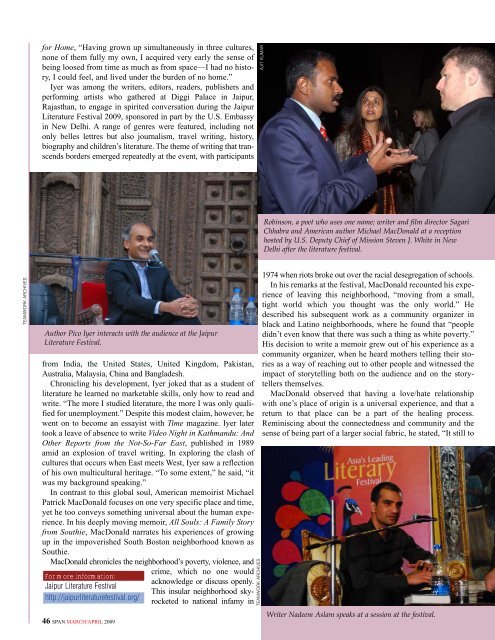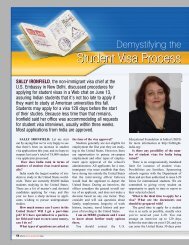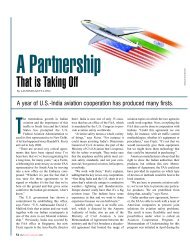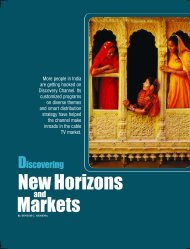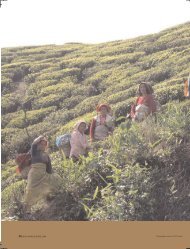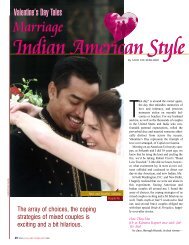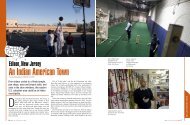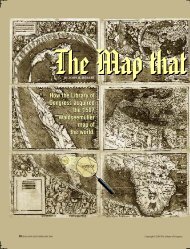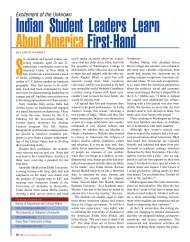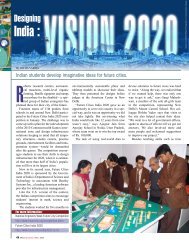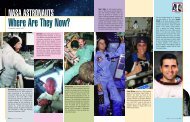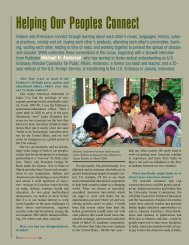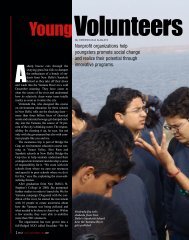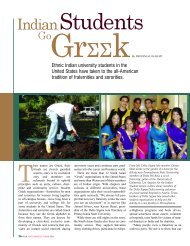Transcending Borders at the Jaipur Literature ... - SPAN Magazine
Transcending Borders at the Jaipur Literature ... - SPAN Magazine
Transcending Borders at the Jaipur Literature ... - SPAN Magazine
You also want an ePaper? Increase the reach of your titles
YUMPU automatically turns print PDFs into web optimized ePapers that Google loves.
TEAMWORK ARCHIVES<br />
for Home, “Having grown up simultaneously in three cultures,<br />
none of <strong>the</strong>m fully my own, I acquired very early <strong>the</strong> sense of<br />
being loosed from time as much as from space—I had no history,<br />
I could feel, and lived under <strong>the</strong> burden of no home.”<br />
Iyer was among <strong>the</strong> writers, editors, readers, publishers and<br />
performing artists who g<strong>at</strong>hered <strong>at</strong> Diggi Palace in <strong>Jaipur</strong>,<br />
Rajasthan, to engage in spirited convers<strong>at</strong>ion during <strong>the</strong> <strong>Jaipur</strong><br />
Liter<strong>at</strong>ure Festival 2009, sponsored in part by <strong>the</strong> U.S. Embassy<br />
in New Delhi. A range of genres were fe<strong>at</strong>ured, including not<br />
only belles lettres but also journalism, travel writing, history,<br />
biography and children’s liter<strong>at</strong>ure. The <strong>the</strong>me of writing th<strong>at</strong> transcends<br />
borders emerged repe<strong>at</strong>edly <strong>at</strong> <strong>the</strong> event, with participants<br />
Author Pico Iyer interacts with <strong>the</strong> audience <strong>at</strong> <strong>the</strong> <strong>Jaipur</strong><br />
Liter<strong>at</strong>ure Festival.<br />
from India, <strong>the</strong> United St<strong>at</strong>es, United Kingdom, Pakistan,<br />
Australia, Malaysia, China and Bangladesh.<br />
Chronicling his development, Iyer joked th<strong>at</strong> as a student of<br />
liter<strong>at</strong>ure he learned no marketable skills, only how to read and<br />
write. “The more I studied liter<strong>at</strong>ure, <strong>the</strong> more I was only qualified<br />
for unemployment.” Despite this modest claim, however, he<br />
went on to become an essayist with Time magazine. Iyer l<strong>at</strong>er<br />
took a leave of absence to write Video Night in K<strong>at</strong>hmandu: And<br />
O<strong>the</strong>r Reports from <strong>the</strong> Not-So-Far East, published in 1989<br />
amid an explosion of travel writing. In exploring <strong>the</strong> clash of<br />
cultures th<strong>at</strong> occurs when East meets West, Iyer saw a reflection<br />
of his own multicultural heritage. “To some extent,” he said, “it<br />
was my background speaking.”<br />
In contrast to this global soul, American memoirist Michael<br />
P<strong>at</strong>rick MacDonald focuses on one very specific place and time,<br />
yet he too conveys something universal about <strong>the</strong> human experience.<br />
In his deeply moving memoir, All Souls: A Family Story<br />
from Southie, MacDonald narr<strong>at</strong>es his experiences of growing<br />
up in <strong>the</strong> impoverished South Boston neighborhood known as<br />
Southie.<br />
MacDonald chronicles <strong>the</strong> neighborhood’s poverty, violence, and<br />
For more inform<strong>at</strong>ion:<br />
<strong>Jaipur</strong> Liter<strong>at</strong>ure Festival<br />
http://jaipurliter<strong>at</strong>urefestival.org/<br />
46 <strong>SPAN</strong> MARCH/APRIL 2009<br />
crime, which no one would<br />
acknowledge or discuss openly.<br />
This insular neighborhood skyrocketed<br />
to n<strong>at</strong>ional infamy in<br />
AJIT KUMAR<br />
TEAMWORK ARCHIVES<br />
Robinson, a poet who uses one name; writer and film director Sagari<br />
Chhabra and American author Michael MacDonald <strong>at</strong> a reception<br />
hosted by U.S. Deputy Chief of Mission Steven J. White in New<br />
Delhi after <strong>the</strong> liter<strong>at</strong>ure festival.<br />
1974 when riots broke out over <strong>the</strong> racial desegreg<strong>at</strong>ion of schools.<br />
In his remarks <strong>at</strong> <strong>the</strong> festival, MacDonald recounted his experience<br />
of leaving this neighborhood, “moving from a small,<br />
tight world which you thought was <strong>the</strong> only world.” He<br />
described his subsequent work as a community organizer in<br />
black and L<strong>at</strong>ino neighborhoods, where he found th<strong>at</strong> “people<br />
didn’t even know th<strong>at</strong> <strong>the</strong>re was such a thing as white poverty.”<br />
His decision to write a memoir grew out of his experience as a<br />
community organizer, when he heard mo<strong>the</strong>rs telling <strong>the</strong>ir stories<br />
as a way of reaching out to o<strong>the</strong>r people and witnessed <strong>the</strong><br />
impact of storytelling both on <strong>the</strong> audience and on <strong>the</strong> storytellers<br />
<strong>the</strong>mselves.<br />
MacDonald observed th<strong>at</strong> having a love/h<strong>at</strong>e rel<strong>at</strong>ionship<br />
with one’s place of origin is a universal experience, and th<strong>at</strong> a<br />
return to th<strong>at</strong> place can be a part of <strong>the</strong> healing process.<br />
Reminiscing about <strong>the</strong> connectedness and community and <strong>the</strong><br />
sense of being part of a larger social fabric, he st<strong>at</strong>ed, “It still to<br />
Writer Nadeem Aslam speaks <strong>at</strong> a session <strong>at</strong> <strong>the</strong> festival.


